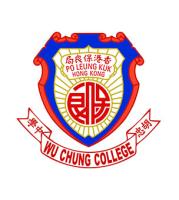| Language Policy |
We have classes using English as the medium of instruction at junior levels. For other junior classes, Mathematics and Science are taught in English and therefore students' English proficiency can be greatly improved. Small class teaching helps to enhance the English Language proficiency of students. Students are divided into small classes for the English lessons and there are altogether 33 teaching groups, which is conducive to individual counselling. The percentage of our students reaching Level 3 or above in Chinese Language and English Language are above the average of all candidates. Our school sent two teams to participate in the Hong Kong Secondary School Debate Competition and completed it with a record-breaking result-both teams won the champions. Our morning assemblies are conducted in Cantonese, English and Putonghua. Supported by QSIP of CUHK and led by the English Panel Chairperson, the English Panel works together with Geography, History and Life and Society Departments on language across the curriculum (LAC) to enhance students' ability and confidence to learn various subjects in English. |
| Learning and Teaching Strategies |
1. Learning and teaching: We promote self-regulated learning, placing emphasis on lesson preparation and note-taking skills. We adopt ‘Assessment for Learning’ and implement interactive learning approaches in our lessons. We especially focus on the development of our students’ reading ability and the learning of core subjects.<br>2. Enhancement programmes in the junior forms: Starting from S.2, enhancement programmes for core subjects are provided to help students build stronger foundations in preparation for the HKDSE.<br>3. STEM and gifted education: Gifted education programmes are available for the junior form students. |
| School-based curriculum |
1. Electives: 2X and 3X. Students can also take Mathematics Extended Part Module 2 as an elective.<br> 2. Curriculum highlights: We offer 10 subjects to cater for students' diverse interests. Small group learning and teaching are carried out in core subjects. Also, we offer school based STEM courses and learning skills for junior form students. Arts Education and Career and Life Planning lessons are implemented at senior secondary levels. |
| Approach to Catering for Learner Diversity |
We have remedial teaching in English, Chinese and Mathematics at junior levels. Having two form teachers for each class enhances the pastoral care for students. We organize various workshops and activities to help students develop their character strengths so that students will have a stronger sense of well-being. We also strive to develop students’ ability to show gratitude and encourage teachers and parents to communicate with students using positive expressions. Junior form students will also take part in the “I Promise” scheme funded by Quality Education Fund. As for senior forms, we promote career and life planning. We also operate after school supplementary revision programmes and other programmes for the less capable students. |
| Approach to Integrated Education |
Established Student Support Team and appointed a senior teacher as SENCO. Emphasis on home-school cooperation, SST member as an executive member of PTA. Close liaison with school counselor, school social worker and educational psychologist. A case conference is held when necessary. |
| Education Support for Non-Chinese Speaking (NCS) Students |
|
| Home-School Co-operation |
Our PTA was set up in 1997. We arrange Parents Reading Club and voluntary services for the elderly. Our parents act as role models to their children. |
| School Ethos |
With our belief in rigour and care, ensuring students’ good discipline is our major concern. Various disciplinary and guidance programmes are launched to regulate the behaviour of our students. Our students are appraised by their parents and neighbors. |
| School Development Plan |
1. To optimise the curriculum and promote language across curriculum; to consolidate strategies for self-regulated learning and boosting students' motivation for learning<br>2. To continue promoting positive education and well-being; to provide opportunities for WuChungers to utilise their strengths in the service of others. |
| Teacher Professional Training and Development |
Teachers’ development is enhanced through development days of different themes, lesson co-planning and peer lesson observation. In order to turn our staff into a learning community, teachers are encouraged to take professional development courses. The collaboration with QSIP of CUHK helps enhance the leadership of middle management and improve teachers’ strategies for promoting self-regulated learning and boosting students’ confidence in learning. Project Well-being funded by The Hong Kong Jockey Club Charities Trust serves as a valuable resource for promoting a positive culture in school and help students develop their character strengths and growth mindset. |
| Life-wide Learning |
1. Leadership: Students' bodies and organisations such as the Student Union, School Prefects, Sunshine Buddies, Career and Life Planning Prefects, Student Ambassadors, Academic Prefects, Student Librarians, Campus Management Ambassadors, etc. <br>2. Extra-curricular activities: A total of over 40 school clubs are available. Each student is required to join at least one. Students are encouraged to participate in inter-school competitions and activities to broaden their horizons. Students get to learn various musical instrumental, dance and ball games. <br>3. Voluntary service: Service learning is promoted. Students from different forms are required to do voluntary work to serve the community. Our school participates in the V Go Easy Award Scheme organised by the Hong Kong Children & Youth Services.<br>4. Wu Chung Cafe and Wu Chung Tea Club have been set up to train students' patience and concentration. They also provide opportunities for students to serve and enhance their ability to appreciate different cultures. <br>5. Uniform groups are available: Girl Guides, Red Cross Youth—Youth Unit, Civil Aid Service and Immigration Department Youth Leader Corps to add colours to students' school life.<br>6. Chinese Martial Arts Club exposes students to the traditional Chinese culture. Not only does it enhance students' physical competence, but it also boosts students' self-discipline, resilience and perseverance. <br>7. Other learning experiences include art education, career and life planning programmes, community service and job shadowing and tasting programmes to broaden students' horizons.<br><br> |
